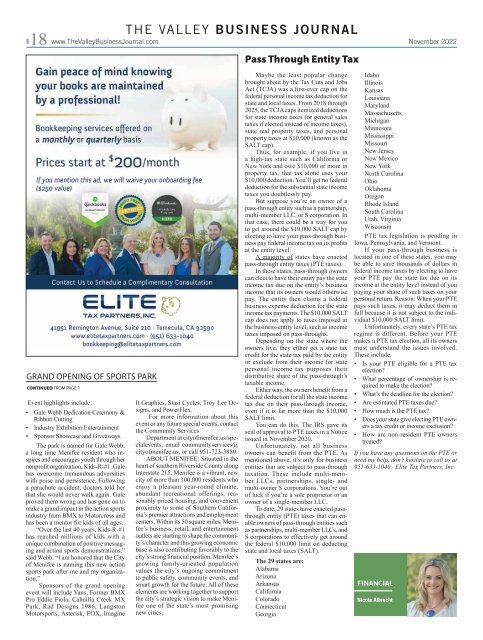You also want an ePaper? Increase the reach of your titles
YUMPU automatically turns print PDFs into web optimized ePapers that Google loves.
THE VALLEY BUSINESS JOURNAL<br />
18 www.TheValleyBusinessJournal.com<br />
<strong>November</strong> 20<strong>22</strong><br />
Pass Through Entity Tax<br />
GRAND OPENING OF SPORTS PARK<br />
CONTINUED FROM PAGE 1<br />
Event highlights include:<br />
• Gale Webb Dedication Ceremony &<br />
Ribbon Cutting<br />
• Industry Exhibition Entertainment<br />
• Sponsor Showcase and Giveaways<br />
The park is named for Gale Webb,<br />
a long time Menifee resident who inspires<br />
and encourages youth through her<br />
nonprofit organization, Kids-R-#1. Gale<br />
has overcome tremendous adversities<br />
with poise and persistence. Following<br />
a parachute accident, doctors told her<br />
that she would never walk again. Gale<br />
proved them wrong and has gone on to<br />
make a grand impact in the action sports<br />
industry from BMX to Motorcross and<br />
has been a mentor for kids of all ages.<br />
“Over the last 40 years, Kids-R-#1<br />
has reached millions of kids with a<br />
unique combination of positive messaging<br />
and action sports demonstrations,”<br />
said Webb. “I am honored that the City<br />
of Menifee is naming this new action<br />
sports park after me and my organization.”<br />
Sponsors of the grand opening<br />
event will include Vans, Former BMX<br />
Pro Eddie Fiola, Cahuilla Creek MX<br />
Park, Rad Designs 1986, Langston<br />
Motorsports, Asterisk, FOX, Imagine<br />
It Graphics, Stasi Cycles, Troy Lee Designs,<br />
and PowerFlex.<br />
For more information about this<br />
event or any future special events, contact<br />
the Community Services<br />
Department at cityofmenifee.us/specialevents,<br />
email communityservices@<br />
cityofmenifee.us, or call 951-723-3880.<br />
ABOUT MENIFEE: Situated in the<br />
heart of southern Riverside County along<br />
Interstate 215, Menifee is a vibrant, new<br />
city of more than 100,000 residents who<br />
enjoy a pleasant year-round climate,<br />
abundant recreational offerings, reasonably<br />
priced housing, and convenient<br />
proximity to some of Southern California’s<br />
premier attractions and employment<br />
centers. Within its 50 square miles, Menifee’s<br />
business, retail, and entertainment<br />
outlets are starting to shape the community’s<br />
character and this growing economic<br />
base is also contributing favorably to the<br />
city’s strong financial position. Menifee’s<br />
growing family-oriented population<br />
values the city’s ongoing commitment<br />
to public safety, community events, and<br />
smart growth for the future. All of these<br />
elements are working together to support<br />
the city’s strategic vision to make Menifee<br />
one of the state’s most promising<br />
new cities.<br />
Maybe the least popular change<br />
brought about by the Tax Cuts and Jobs<br />
Act (TCJA) was a first-ever cap on the<br />
federal personal income tax deduction for<br />
state and local taxes. From 2018 through<br />
2025, the TCJA caps itemized deductions<br />
for state income taxes (or general sales<br />
taxes if elected instead of income taxes),<br />
state real property taxes, and personal<br />
property taxes at $10,000 (known as the<br />
SALT cap).<br />
Thus, for example, if you live in<br />
a high-tax state such as California or<br />
New York and owe $10,000 or more in<br />
property tax, that tax alone uses your<br />
$10,000 deduction. You’ll get no federal<br />
deduction for the substantial state income<br />
taxes you doubtlessly pay.<br />
But suppose you’re an owner of a<br />
pass-through entity such as a partnership,<br />
multi-member LLC, or S corporation. In<br />
that case, there could be a way for you<br />
to get around the $10,000 SALT cap by<br />
electing to have your pass-through business<br />
pay federal income tax on its profits<br />
at the entity level.<br />
A majority of states have enacted<br />
pass-through entity taxes (PTE taxes).<br />
In these states, pass-through owners<br />
can elect to have their entity pay the state<br />
income tax due on the entity’s business<br />
income that its owners would otherwise<br />
pay. The entity then claims a federal<br />
business expense deduction for the state<br />
income tax payments. The $10,000 SALT<br />
cap does not apply to taxes imposed at<br />
the business-entity level, such as income<br />
taxes imposed on pass-throughs.<br />
Depending on the state where the<br />
owners live, they either get a state tax<br />
credit for the state tax paid by the entity<br />
or exclude from their income for state<br />
personal income tax purposes their<br />
distributive share of the pass-through’s<br />
taxable income.<br />
Either way, the owners benefit from a<br />
federal deduction for all the state income<br />
tax due on their pass-through income,<br />
even if it is far more than the $10,000<br />
SALT limit.<br />
You can do this. The IRS gave its<br />
seal of approval to PTE taxes in a Notice<br />
issued in <strong>November</strong> 2020.<br />
Unfortunately, not all business<br />
owners can benefit from the PTE. As<br />
mentioned above, it’s only for business<br />
entities that are subject to pass-through<br />
taxation. These include multi-member<br />
LLCs, partnerships, single- and<br />
multi-owner S corporations. You’re out<br />
of luck if you’re a sole proprietor or an<br />
owner of a single-member LLC.<br />
To date, 29 states have enacted passthrough<br />
entity (PTE) taxes that can enable<br />
owners of pass-through entities such<br />
as partnerships, multi-member LLCs, and<br />
S corporations to effectively get around<br />
the federal $10,000 limit on deducting<br />
state and local taxes (SALT).<br />
The 29 states are:<br />
Alabama<br />
Arizona<br />
Arkansas<br />
California<br />
Colorado<br />
Connecticut<br />
Georgia<br />
Idaho<br />
Illinois<br />
Kansas<br />
Louisiana<br />
Maryland<br />
Massachusetts<br />
Michigan<br />
Minnesota<br />
Mississippi<br />
Missouri<br />
New Jersey<br />
New Mexico<br />
New York<br />
North Carolina<br />
Ohio<br />
Oklahoma<br />
Oregon<br />
Rhode Island<br />
South Carolina<br />
Utah, Virginia<br />
Wisconsin<br />
PTE tax legislation is pending in<br />
Iowa, Pennsylvania, and Vermont.<br />
If your pass-through business is<br />
located in one of these states, you may<br />
be able to save thousands of dollars in<br />
federal income taxes by electing to have<br />
your PTE pay the state tax due on its<br />
income at the entity level instead of you<br />
paying your share of such taxes on your<br />
personal return. Reason: When your PTE<br />
pays such taxes, it may deduct them in<br />
full because it is not subject to the individual<br />
$10,000 SALT limit.<br />
Unfortunately, every state’s PTE tax<br />
regime is different. Before your PTE<br />
makes a PTE tax election, all its owners<br />
must understand the issues involved.<br />
These include:<br />
• Is your PTE eligible for a PTE tax<br />
election?<br />
• What percentage of ownership is required<br />
to make the election?<br />
• What’s the deadline for the election?<br />
• Are estimated PTE taxes due?<br />
• How much is the PTE tax?<br />
• Does your state give electing PTE owners<br />
a tax credit or income exclusion?<br />
• How are non-resident PTE owners<br />
treated?<br />
If you have any questions on the PTE or<br />
need my help, don’t hesitate to call us at<br />
951-633-1040. Elite Tax Partners, Inc.<br />
FINANCIAL<br />
NIcole Albrecht
















